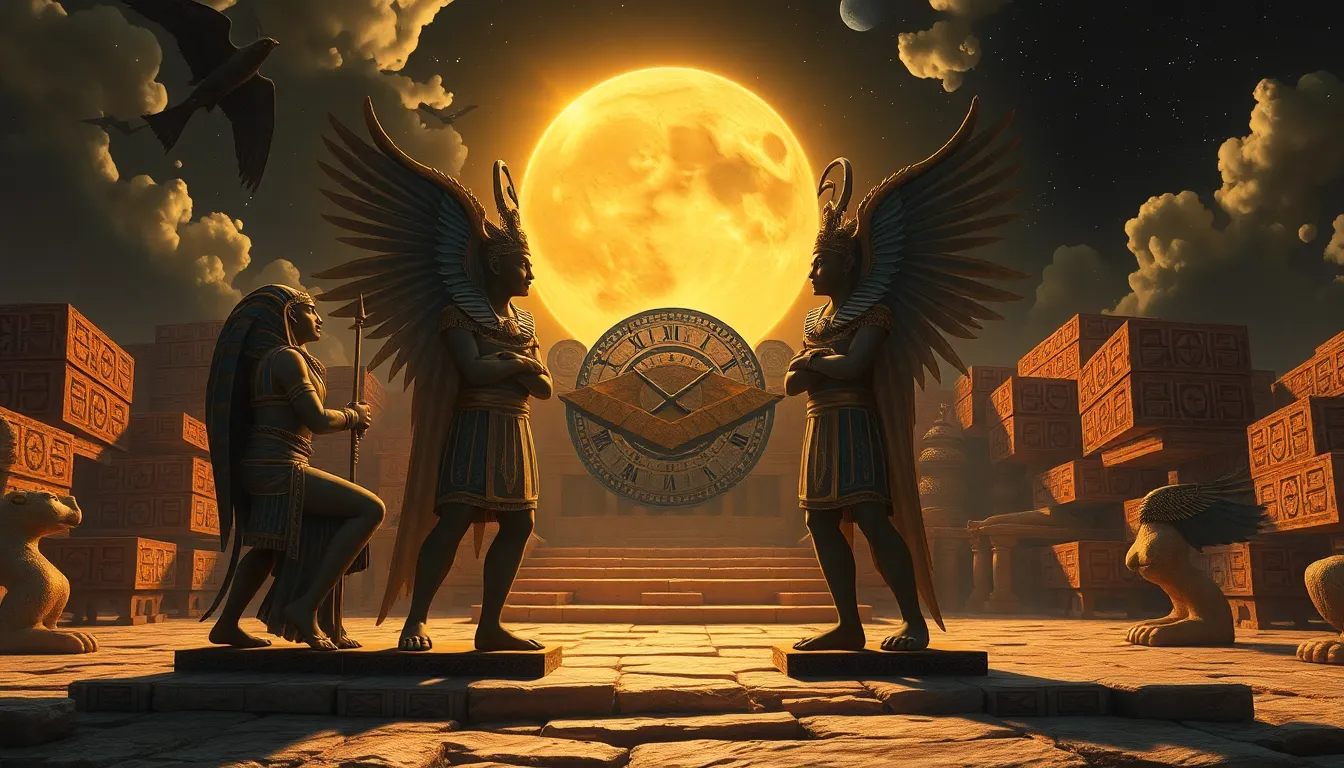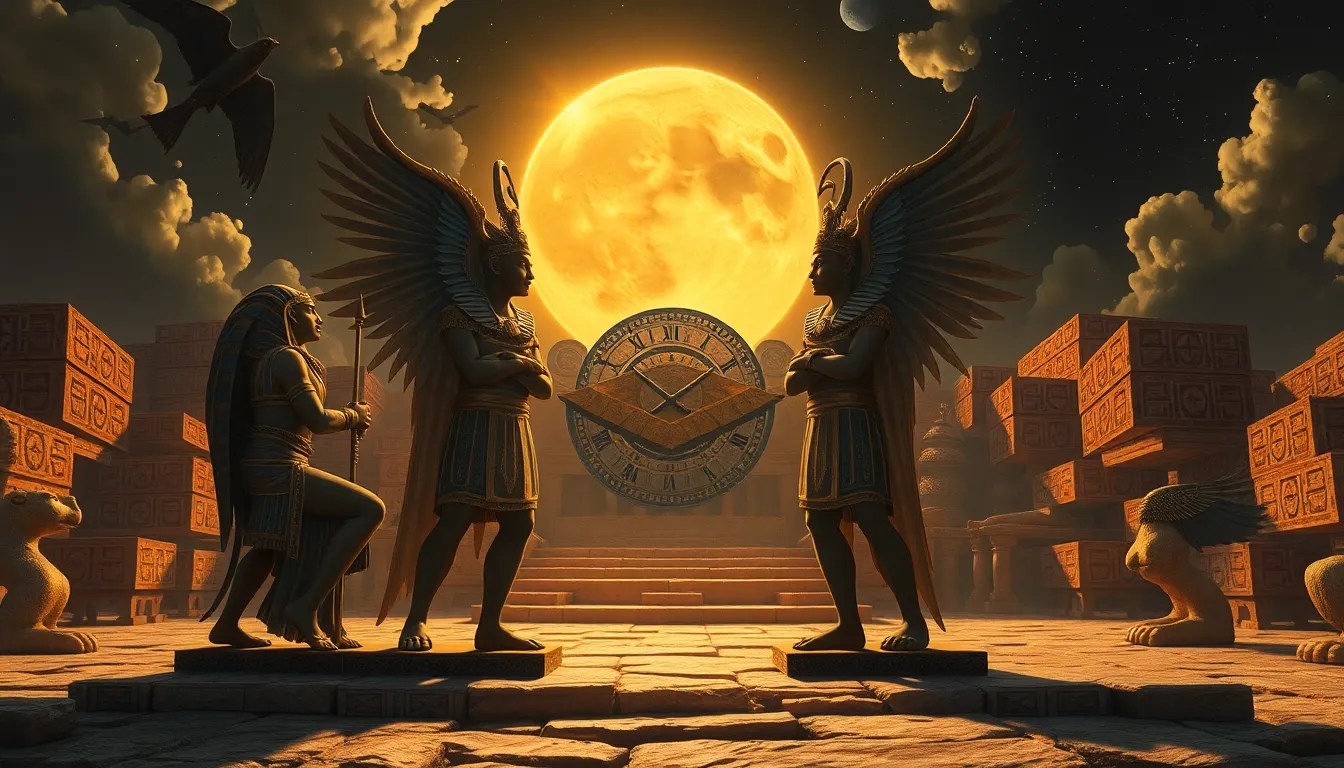The Guardians of Time: How Deities Protected the Cycles of Life
I. Introduction
Throughout history, cultures around the world have grappled with the concept of time, attempting to understand its nature and significance. Time is often seen as a relentless force, measuring the passing of moments, seasons, and lifetimes. In various mythological frameworks, the gods and goddesses embody these temporal dimensions, governing the cycles of life and death.
This article aims to explore the intersection of deities and time, highlighting their vital roles in maintaining the cycles of life. By examining how different cultures perceive time and the divine, we can grasp the profound influence these beliefs have on human existence.
II. The Concept of Time in Mythology
Time is a multifaceted concept, with varying interpretations across cultures. Some view time as a linear progression from past to future, while others embrace a cyclical understanding, where events recur in a continuous loop.
For instance:
- Cyclical Time: Many indigenous cultures believe in the cyclical nature of time, where seasons, life, and death are interconnected. This perspective emphasizes rebirth and renewal.
- Linear Time: In contrast, Western philosophies often adopt a linear view, seeing time as a straight path leading to a definitive end.
Mythological frameworks, such as the Hindu concept of Yugas, reflect these views. The Yugas represent cycles of creation and destruction, illustrating how time is both a creator and a destroyer.
III. Major Deities Associated with Time
Across various mythologies, certain deities are specifically associated with the passage of time. These figures serve as guardians of temporal cycles, influencing how societies understand and relate to time. Key deities include:
A. Overview of key deities from different mythologies
- Chronos (Greek): Often depicted as an old man with a long beard, Chronos personifies time itself, representing the endless flow of moments.
- Kairos (Greek): Unlike Chronos, who symbolizes chronological time, Kairos embodies the opportune moment, emphasizing the importance of seizing the right time.
- Shiva (Hindu): In Hinduism, Shiva is known as the destroyer and transformer, representing the cyclical nature of creation and destruction in the universe.
- Anansi (African): While primarily known as a trickster god, Anansi also embodies the concept of time, teaching valuable lessons about patience and the importance of timing in decision-making.
These deities play crucial roles in governing the passage of time, reminding humanity of the transient nature of existence.
IV. The Role of Deities in Agricultural Cycles
Agriculture, the backbone of many ancient civilizations, is intrinsically linked to the cycles of nature and time. Deities governing fertility and harvest cycles were revered, as they ensured the sustenance of communities.
A. Fertility gods and goddesses
Many cultures worshipped fertility deities to ensure bountiful harvests:
- Demeter (Greek): The goddess of the harvest, Demeter was celebrated for her role in the growth of crops and the changing of the seasons.
- Ceres (Roman): The Roman counterpart of Demeter, Ceres was also associated with agriculture and was honored through various festivals.
B. Seasonal celebrations and rituals linked to deities
Seasonal festivals, often tied to agricultural cycles, were crucial in many cultures:
- Harvest Festivals: Celebrations held to thank deities for the bounty of the land.
- Planting Rituals: Ceremonies conducted to invoke blessings for a successful growing season.
C. Myths surrounding planting and harvest
Numerous myths illustrate the relationship between deities and agricultural cycles, depicting how gods and goddesses influence the fertility of the earth.
V. Deities as Guardians of Life Cycles
The cycle of life encompasses birth, death, and rebirth, with deities representing each stage. These guardians help humans navigate the complexities of existence.
A. Birth, death, and rebirth: the cycle of life
Many cultures believe that life and death are interconnected, and deities often serve as protectors of these transitions.
B. Deities associated with different life stages
- Inanna (Sumerian): Represents love, war, and fertility, embodying aspects of life and death.
- Hades (Greek): The god of the underworld, overseeing the realm of the dead.
C. Rituals and practices to honor these deities
Communities often perform rituals to honor deities associated with various life stages, seeking blessings for safe passages through life’s transitions.
VI. The Influence of Time Deities on Human Behavior
Beliefs in time deities have significantly shaped societal norms and behaviors. These influences manifest in various ways:
A. How beliefs in time deities shaped societal norms
Communities often organized their lives around the cycles dictated by their deities, leading to the establishment of calendars and agricultural practices.
B. Festivals and observances related to time and cycles
Many cultures have specific festivals to honor time deities, reflecting their beliefs in the importance of timing and cycles:
- New Year’s Celebrations: Marking the transition into a new cycle.
- Solstice Festivals: Celebrating the changing seasons and the passage of time.
C. The psychological impact of these beliefs on communities
The belief in time deities can create a sense of order and predictability, providing comfort and stability in uncertain times.
VII. Modern Interpretations and Relevance
Despite the passage of time, ancient beliefs about deities and their connection to time persist in modern spirituality. These interpretations offer valuable insights into contemporary life.
A. How ancient beliefs about time and deities persist today
Many spiritual practices continue to honor the cycles of nature and time, reflecting ancient wisdom in modern contexts.
B. The role of time deities in contemporary spirituality
Time deities are often invoked in rituals that emphasize harmony with nature and the importance of timing in personal and communal decisions.
C. Lessons from ancient perspectives on time
Ancient perspectives remind us to respect the rhythms of life and the interconnectedness of all beings within the cycles of time.
VIII. Conclusion
The significance of deities in timekeeping and the cycles of life is profound. These guardians of time remind us of the delicate balance between creation and destruction, life and death.
As we reflect on the enduring connection between spirituality and the cycles of life, it is essential to honor these deities and recognize their influence on our lives. By acknowledging the lessons of ancient wisdom, we can navigate our own cycles with greater awareness and reverence.




